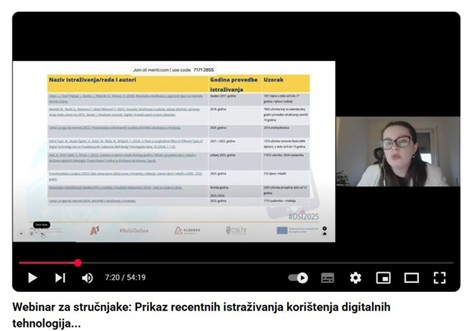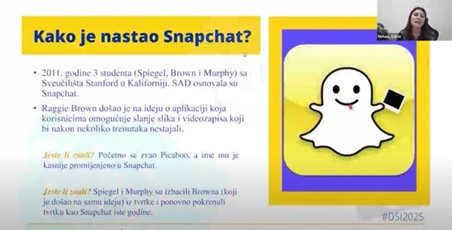This article is part of the campaign DSA for YOUth - Protecting minors by design, focusing on the DSA guidelines for the protection of minors under the DSA, including the age verification (AV) and age-appropriate (AA) measures, and translating these rules into clear, practical, and jargon-free resources. In this insight series, we explore how different Safer Internet Centres are working at the national level to raise awareness about the DSA and how it impacts the everyday lives of young people, their parents or caregivers, and teachers and educators.

The Croatian Safer Internet Centre (SIC) raises awareness among children, young people, teachers and educators, parents, and other stakeholders, including professionals, about key aspects of the Digital Services Act (DSA).
Children and young people
In the main programme, the DSA is not mentioned by name in the sessions with children and young people, but the activities are guided by the DSA’s core principles, with activities including:
- A discussion on how algorithms work and the types of inappropriate content children may encounter on very large online platforms (VLOPs) and very large online search engines (VLOSEs) (as designated under the DSA; read more about VLOPs and VLOSEs here).
- Emphasis is placed on the importance of reporting harmful content and the available reporting mechanisms.
- Excessive screen time and its potential negative consequences are discussed. The SIC advocates for a balanced approach to online and offline activities, promoting tools such as a family agreement to support responsible digital use.
- During Safer Internet Day (SID) 2025, celebrated in February 2025, a workshop was delivered addressing the above topics and targeting Years 1-4 in primary schools.
- An AI chatbot “Bob” is actively promoted, and it is able to help users in reporting inappropriate content by directing them to trusted adults and other relevant support mechanisms.
- Within the elective high school subject digital literacy, the Croatian Safer Internet Centre integrates the key principles promoted by the DSA through practical and age-appropriate educational activities. Students learn how to manage privacy settings on digital platforms, recognise and report inappropriate or illegal online content, and understand their rights and responsibilities when using digital services. The curriculum also covers the importance of transparent algorithms, online accountability, and mechanisms for flagging harmful content. By engaging in discussions, simulations, and case studies, students develop critical thinking skills and awareness of how online platforms moderate content and protect users. In this way, this subject not only promotes safe and responsible digital behaviour but also helps young people understand how European digital regulation safeguards their online environment.
The Croatian youth panel has also been involved in related activities:
- The SIC youth panellists have carried out an analysis of the terms of service on the most popular social media platforms with a focus on hate speech regulations.
- The youth panel has also developed a youth-friendly publication on Snapchat’s terms of use, which is available in both Croatian and English.
Teachers and educators
DSA-related educational materials are distributed to school professionals, which ensures that educators are informed about the framework and its implications for digital safety. During SID 2025, online lectures were held for experts and included an overview of recent research on the use of digital technologies by children and young people in Croatia.

A publication on the same topic can be found here.
Parents and caregivers
- The importance of being honest about a child’s date of birth when setting up an account is emphasised.
- Education is provided about parental control tools, both through dedicated apps and platform-specific settings. For example, as part of SID 2025, the SIC held online lectures for parents about Snapchat and TikTok. The recordings are available from the SIC YouTube channel. Similar lectures took place in schools.

Research
SIC Croatia has conducted three major national research studies (deSHAME I, II & III), examining high school students, elementary school students, and parents on various aspects of online safety, with a particular focus on cyberbullying and online sexual harassment. These studies consistently reveal alarmingly high rates of exposure to online risks, while showing that many children and adolescents neither receive sufficient guidance nor know how to report harmful content. More than half of the young respondents stated that they would ignore the problem if it happened to them, only 19 per cent would report it directly to the social media platform, and as few as 3 per cent would contact the police. The findings from deSHAME I, II and III therefore provide a solid evidence base for the Croatian SIC’s work, especially in the design and implementation of the digital literacy elective subject, which aims to address precisely these gaps through education on privacy settings, reporting mechanisms, and responsible digital behaviour.
Working with the DSC
The Croatian SIC has cultivated a strong, long-standing relationship with the national Digital Services Coordinator (DSC), the Croatian Regulatory Authority for Network Industries (HAKOM), and maintains regular contact with the agency to align on digital safety issues. This established partnership is proving crucial with the implementation of the Digital Services Act.
The SIC has formally expressed its interest in becoming a trusted flagger under the new regulation, aiming to leverage its expertise in identifying harmful content to make the online environment safer for children and young people. This active engagement is confirmed in the DSC's first annual report. The report notes that while the national legal basis for certification was still in development during 2024, HAKOM "was contacted by one potential trusted flagger," with whom an "initial meeting was held" and "regular communication with this entity is ongoing".
While awaiting the finalisation of the national by-law that will specify the procedures for granting this status, this formal DSA-related dialogue is a natural extension of the SIC's existing partnership with the DSC. A prime example of this collaboration is their work on Safer Internet Day (SID) initiatives. For the second consecutive year, in 2026, the two organisations will jointly organise a Safer Internet Day conference targeting both professionals and children, demonstrating a shared, practical commitment to raising awareness about online safety, digital rights, and responsible platform use across Croatia, following the rules in the DSA.
Interested in learning more about the DSA?
If you are interested in more, explore the DSA for YOUth toolkit to learn how the Digital Services Act (DSA) protects minors by design. There, you will find a family-friendly booklet explaining the DSA guidelines on what online platforms should do to keep kids and teens safe online, easy-to-read explainers, a quiz, and other resources.
Interested in learning more about activities in Croatia?
Find more information about the work of the Croatian Safer Internet Centre, including their awareness raising, helpline, hotline, and youth participation services – or find similar information for Safer Internet Centres throughout Europe.
This article is part of the campaign DSA for YOUth - Protecting minors by design, focusing on the DSA guidelines for the protection of minors under the DSA, including the age verification (AV) and age-appropriate (AA) measures, and translating these rules into clear, practical, and jargon-free resources. In this insight series, we explore how different Safer Internet Centres are working at the national level to raise awareness about the DSA and how it impacts the everyday lives of young people, their parents or caregivers, and teachers and educators.

The Croatian Safer Internet Centre (SIC) raises awareness among children, young people, teachers and educators, parents, and other stakeholders, including professionals, about key aspects of the Digital Services Act (DSA).
Children and young people
In the main programme, the DSA is not mentioned by name in the sessions with children and young people, but the activities are guided by the DSA’s core principles, with activities including:
- A discussion on how algorithms work and the types of inappropriate content children may encounter on very large online platforms (VLOPs) and very large online search engines (VLOSEs) (as designated under the DSA; read more about VLOPs and VLOSEs here).
- Emphasis is placed on the importance of reporting harmful content and the available reporting mechanisms.
- Excessive screen time and its potential negative consequences are discussed. The SIC advocates for a balanced approach to online and offline activities, promoting tools such as a family agreement to support responsible digital use.
- During Safer Internet Day (SID) 2025, celebrated in February 2025, a workshop was delivered addressing the above topics and targeting Years 1-4 in primary schools.
- An AI chatbot “Bob” is actively promoted, and it is able to help users in reporting inappropriate content by directing them to trusted adults and other relevant support mechanisms.
- Within the elective high school subject digital literacy, the Croatian Safer Internet Centre integrates the key principles promoted by the DSA through practical and age-appropriate educational activities. Students learn how to manage privacy settings on digital platforms, recognise and report inappropriate or illegal online content, and understand their rights and responsibilities when using digital services. The curriculum also covers the importance of transparent algorithms, online accountability, and mechanisms for flagging harmful content. By engaging in discussions, simulations, and case studies, students develop critical thinking skills and awareness of how online platforms moderate content and protect users. In this way, this subject not only promotes safe and responsible digital behaviour but also helps young people understand how European digital regulation safeguards their online environment.
The Croatian youth panel has also been involved in related activities:
- The SIC youth panellists have carried out an analysis of the terms of service on the most popular social media platforms with a focus on hate speech regulations.
- The youth panel has also developed a youth-friendly publication on Snapchat’s terms of use, which is available in both Croatian and English.
Teachers and educators
DSA-related educational materials are distributed to school professionals, which ensures that educators are informed about the framework and its implications for digital safety. During SID 2025, online lectures were held for experts and included an overview of recent research on the use of digital technologies by children and young people in Croatia.

A publication on the same topic can be found here.
Parents and caregivers
- The importance of being honest about a child’s date of birth when setting up an account is emphasised.
- Education is provided about parental control tools, both through dedicated apps and platform-specific settings. For example, as part of SID 2025, the SIC held online lectures for parents about Snapchat and TikTok. The recordings are available from the SIC YouTube channel. Similar lectures took place in schools.

Research
SIC Croatia has conducted three major national research studies (deSHAME I, II & III), examining high school students, elementary school students, and parents on various aspects of online safety, with a particular focus on cyberbullying and online sexual harassment. These studies consistently reveal alarmingly high rates of exposure to online risks, while showing that many children and adolescents neither receive sufficient guidance nor know how to report harmful content. More than half of the young respondents stated that they would ignore the problem if it happened to them, only 19 per cent would report it directly to the social media platform, and as few as 3 per cent would contact the police. The findings from deSHAME I, II and III therefore provide a solid evidence base for the Croatian SIC’s work, especially in the design and implementation of the digital literacy elective subject, which aims to address precisely these gaps through education on privacy settings, reporting mechanisms, and responsible digital behaviour.
Working with the DSC
The Croatian SIC has cultivated a strong, long-standing relationship with the national Digital Services Coordinator (DSC), the Croatian Regulatory Authority for Network Industries (HAKOM), and maintains regular contact with the agency to align on digital safety issues. This established partnership is proving crucial with the implementation of the Digital Services Act.
The SIC has formally expressed its interest in becoming a trusted flagger under the new regulation, aiming to leverage its expertise in identifying harmful content to make the online environment safer for children and young people. This active engagement is confirmed in the DSC's first annual report. The report notes that while the national legal basis for certification was still in development during 2024, HAKOM "was contacted by one potential trusted flagger," with whom an "initial meeting was held" and "regular communication with this entity is ongoing".
While awaiting the finalisation of the national by-law that will specify the procedures for granting this status, this formal DSA-related dialogue is a natural extension of the SIC's existing partnership with the DSC. A prime example of this collaboration is their work on Safer Internet Day (SID) initiatives. For the second consecutive year, in 2026, the two organisations will jointly organise a Safer Internet Day conference targeting both professionals and children, demonstrating a shared, practical commitment to raising awareness about online safety, digital rights, and responsible platform use across Croatia, following the rules in the DSA.
Interested in learning more about the DSA?
If you are interested in more, explore the DSA for YOUth toolkit to learn how the Digital Services Act (DSA) protects minors by design. There, you will find a family-friendly booklet explaining the DSA guidelines on what online platforms should do to keep kids and teens safe online, easy-to-read explainers, a quiz, and other resources.
Interested in learning more about activities in Croatia?
Find more information about the work of the Croatian Safer Internet Centre, including their awareness raising, helpline, hotline, and youth participation services – or find similar information for Safer Internet Centres throughout Europe.
- DSAforYOUth DSA (Digital Services Act)
Related content
- < Previous article
- Next article >













